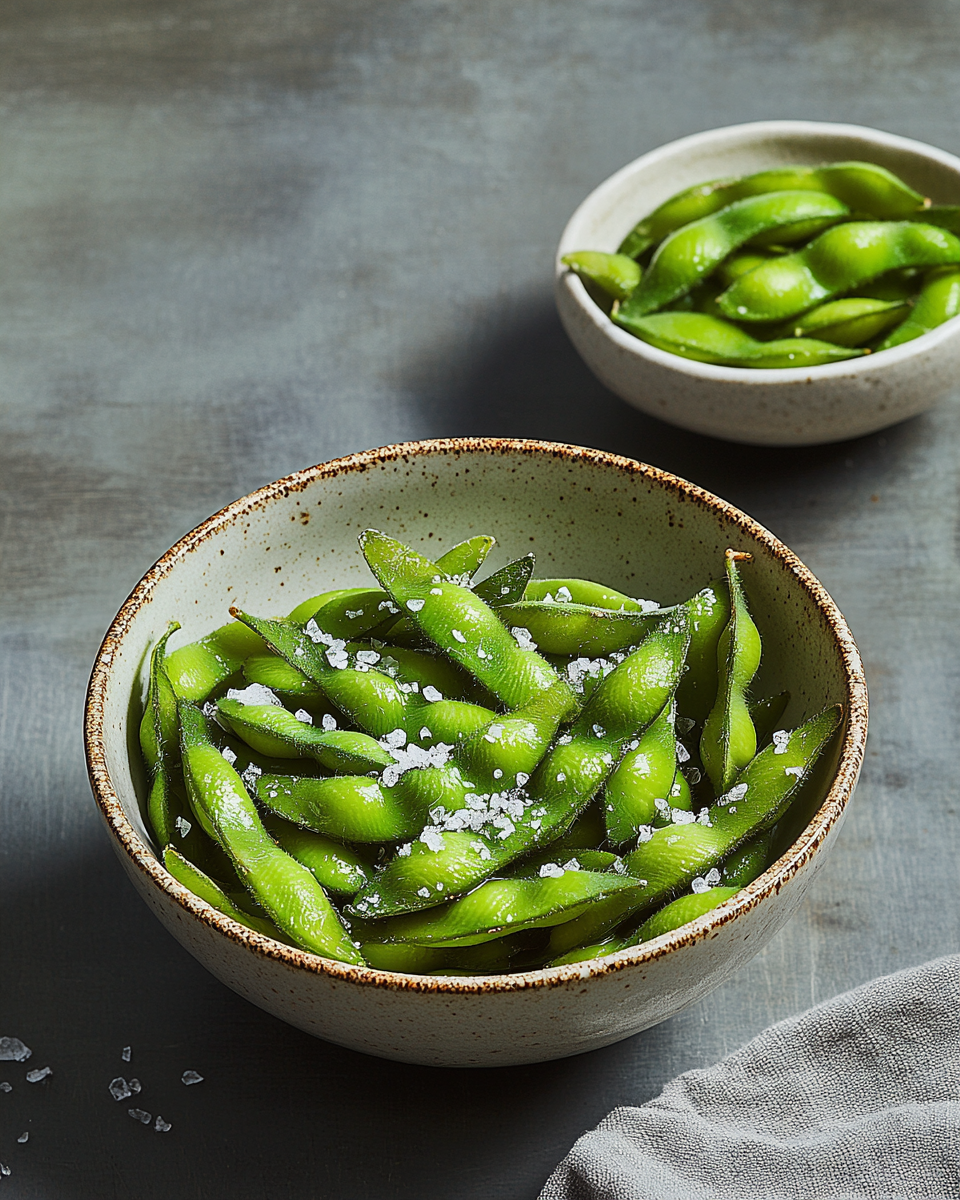A quick and satisfying snack, this boiled edamame with sea salt is rich in plant-based protein and essential nutrients, making it perfect for pregnancy. Simple to prepare and naturally delicious, it’s an excellent choice for curbing hunger between meals while supporting a healthy diet.
FULL RECIPE
Ingredients
- 2 cups edamame in pods (fresh or frozen)
- 1 tablespoon sea salt (plus extra for seasoning)
- 4 cups water
Directions
- Bring 4 cups of water to a boil in a large saucepan.
- Add 1 tablespoon of sea salt to the boiling water.
- Add the edamame pods and boil for 4–5 minutes until tender but still firm.
- Drain the edamame in a colander and shake off excess water.
- Sprinkle additional sea salt over the pods while still warm.
- Serve warm or let cool slightly before eating. Enjoy by popping the beans out of the pod with your fingers.
Nutritional Information
- Calories: 190
- Protein: 17g
- Carbohydrates: 14g
- Fiber: 8g
- Fat: 8g
- Sodium: 300mg (varies with added salt)
- Iron and folate: High levels
Nutritional Benefits of Edamame
Edamame is a powerhouse of nutrition, especially beneficial for pregnant women due to its high protein content. It provides all nine essential amino acids, making it a complete plant-based protein source. Beyond protein, edamame is rich in dietary fiber, which aids digestion and helps prevent constipation—a common pregnancy complaint. It also contains essential vitamins such as folate, which is critical for fetal development, and minerals like iron, calcium, and magnesium that support both mother and baby.
High Protein Content for Pregnancy
Protein is vital during pregnancy to support the growing fetus and maternal tissue expansion. Edamame offers an impressive amount of plant-based protein, about 17 grams per cup, making it an excellent alternative for those who prefer vegetarian or vegan diets. This protein contributes to muscle growth, repair, and overall immune function.
The Role of Fiber in Digestive Health
The fiber content in edamame helps maintain healthy bowel movements, which is crucial during pregnancy when hormonal changes often slow digestion. Regular intake of fiber-rich foods like edamame can reduce bloating and discomfort by preventing constipation.
Folate and Its Importance
Folate, a B-vitamin abundantly found in edamame, plays a vital role in preventing neural tube defects during fetal development. Pregnant women require increased folate intake, and consuming edamame regularly can help meet this essential nutritional need naturally.
Rich Source of Iron
Iron is necessary to increase blood volume and prevent anemia during pregnancy. Edamame contains non-heme iron, which, when paired with vitamin C-rich foods, can be effectively absorbed. Ensuring adequate iron intake helps maintain energy levels and supports fetal growth.
Low in Calories, High in Nutrients
Despite being nutrient-dense, edamame is relatively low in calories, making it a healthy snack option to satisfy hunger without excessive calorie intake. This quality supports healthy weight management during pregnancy.
Antioxidants and Phytochemicals in Edamame
Edamame contains antioxidants such as isoflavones, which may provide anti-inflammatory benefits. These compounds help protect cells from oxidative stress and support overall maternal health, which can be beneficial during pregnancy.
Hydration and Edamame
While edamame itself is not a hydrating food, the simple preparation by boiling it in salted water can contribute to hydration. Proper hydration supports circulation and reduces swelling, which are common concerns for expectant mothers.
How Sea Salt Enhances Flavor and Nutrition
Using sea salt in boiled edamame enhances its natural flavor without the need for heavy sauces or additives. Sea salt also contains trace minerals, but it should be used in moderation to avoid excessive sodium intake during pregnancy.
Quick and Easy Preparation
The simplicity of boiling edamame makes it an accessible snack for pregnant women with busy schedules. It requires minimal cooking time and effort, allowing for a nutritious option even on hectic days.
Versatility of Edamame in Meals
Beyond snacking, edamame can be incorporated into salads, stir-fries, soups, and even purees. This versatility encourages diverse meal planning, which is important for balanced nutrition during pregnancy.
Edamame as a Plant-Based Alternative
For those reducing meat consumption, edamame serves as a satisfying protein alternative. It fits well within vegetarian, vegan, and flexitarian diets, supporting pregnancy nutrition goals without reliance on animal products.
Potential Allergies and Sensitivities
Soy products, including edamame, may trigger allergic reactions in some individuals. Pregnant women should be aware of any soy allergies and consult healthcare providers before increasing intake.
Sustainability and Environmental Impact
Edamame, as a legume, has a relatively low environmental footprint compared to animal proteins. Choosing plant-based snacks like edamame aligns with sustainable eating practices, which some expectant mothers prioritize.
Economic Considerations
Edamame is generally affordable and widely available in fresh or frozen forms. This accessibility makes it an economical choice for nutritious snacking during pregnancy.
Cultural Significance and Popularity
Originating from East Asia, edamame has gained global popularity due to its health benefits and flavor. Its inclusion in diverse cuisines provides cultural variety for pregnant women seeking to expand their diet.
Storage and Shelf Life
Frozen edamame retains its nutritional quality well and can be stored for extended periods, making it convenient for meal prep and reducing food waste in pregnancy nutrition planning.
Pairing Edamame with Other Nutrient-Rich Foods
Combining edamame with vitamin C-rich foods such as citrus fruits can enhance iron absorption. Such pairings optimize the nutritional benefits, supporting better maternal health.
Edamame and Blood Sugar Control
Due to its fiber and protein content, edamame has a low glycemic index and can help regulate blood sugar levels. This characteristic is particularly valuable for pregnant women managing gestational diabetes.
Conclusion
Boiled edamame with sea salt is much more than a simple snack; it is a nutrient-dense food offering numerous health benefits that support pregnancy. Its high protein and fiber content, along with vital vitamins and minerals, contribute to both maternal well-being and fetal development. Easy to prepare, affordable, and versatile, edamame is an excellent addition to the pregnancy diet. Including this wholesome snack can help manage common pregnancy symptoms like fatigue and digestive discomfort while providing sustainable nutrition. For expectant mothers seeking a natural, delicious, and healthful option, boiled edamame with sea salt stands out as a smart and tasty choice.





